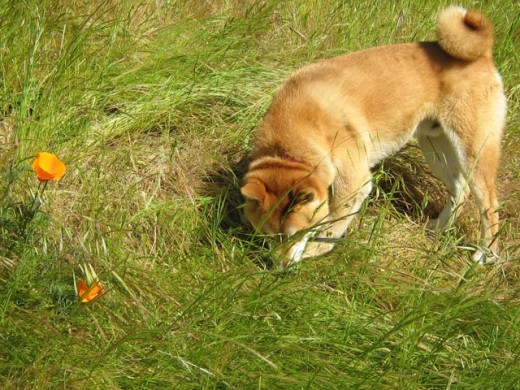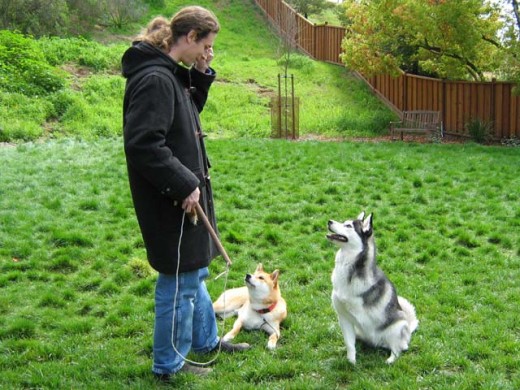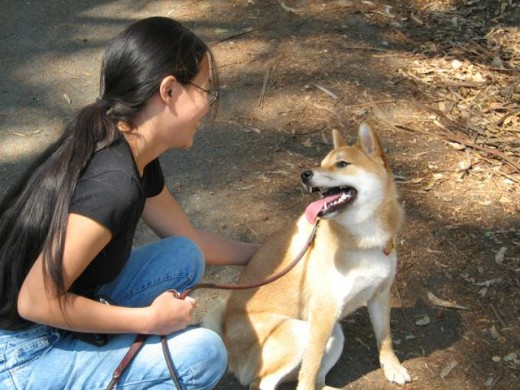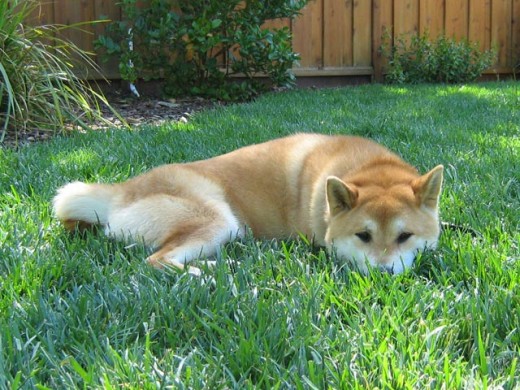Why do dogs eat poop?
Dogs eat poop for a variety of reasons including –
- Nutritional imbalance – When a dog eats his own poop, it may be because the stool still has undigested minerals and nutrients.
- Stress – A dog may poop because of extreme anxiety (e.g. when left alone), and then eat up his own feces as a displacement behavior.
- Boredom – Lack of activity and interaction may cause a dog to start playing with his stool and sometimes eat it.
- Enjoyment – Many dogs like the taste of leavings from cats or other animals. My dogs also like smelling the stuff and scenting it with their tongue.
- Clean-up – Some dogs may eat poop inside the house to keep their living space clean. Dogs that are physically punished for potty training mistakes, may learn to eat their own poop to avoid our anger or strong discipline.
- Any combination of the above.
Whether eating feces is harmful to our dog will depend on whether it is contaminated with worms, fleas, or other parasites that may carry bacteria and viruses. The consequences of eating contaminated feces will also depend on the immune system and general health of our dog. Young puppies, for example, have developing immune systems, and may be more susceptible to bad stool; especially if they have not been fully vaccinated. To be safe, I only take my puppy out on hikes and neighborhood walks, after he has received all of his vaccination shots.
The most effective method to stop our dog from eating poop, will depend on the reason for his behavior, his temperament, as well as our own preferences.

1. Feed our dog a healthy and balanced diet.
The easiest balanced food to give our dog is dry kibble. Dry kibble is nutritionally balanced and results in less teeth tartar.
Make sure to get a high quality kibble, with good protein sources, and no unhealthy fillers.
Some well reviewed kibble brands include Wellness CORE, Blue Wilderness, Nature’s Variety Instinct, and Orijen.

2. Fixed feeding schedule and on-leash supervision.

If we keep our dog on a fixed eating schedule, it will help keep his poop schedule regular and predictable as well.
A fixed schedule makes it easier for us to supervise our dog, and prevent him from eating his own feces or those from our other dogs.
During poop time –
- I put the problem dog on a leash, and walk him out on-leash to do his business first.
- If he tries to eat his own feces, I no-mark him (Ack-ack) and lead him away from it. I get him to do some obedience commands, and then try again. If he does not try to pull towards the bad stuff, I praise him and reward him well.
- I keep sessions short, and end on a positive note.
- I make sure to clean up after him.
- If we have other dogs, only let them out after cleaning up.
- Make sure to keep the problem dog on-leash, so that we may supervise and prevent poop eating when our other dogs are out.

3. Keep our dogs busy and well-exercised.
Bored dogs will frequently develop behavioral issues and cause property damage.
It is important to walk our dog regularly (preferably every day), and to provide structured, interesting activities, to keep his mind sharp and engaged.
My dogs work for all of their food, either by performing dog obedience commands, or through interactive food toys. If we provide a lot of alternative activities for our dog, he will be less likely to find unacceptable entertainment on his own, including eating his own feces.
If we are busy in the short-term, and do not have the time to give our dog the attention that he needs, consider sending him to dog daycare or hiring a pet sitter.

4. Keep our dog’s environment clean.
Scoop up after our dog, as soon as he is done with his business. If we keep things clean, there will be less chance for him to engage in opportunistic poop eating.
During retraining, it is also important to supervise our dog closely, so that he does not practice any bad behavior on his own. We may have to go back to dog potty training basics, to fully stop him from eating his own poop.

5. Help our dog reduce stress.
Identify situations that cause extreme stress in our dog, and try to reduce the number of stressful encounters. In the meantime, practice managed desensitization exercises, to help reduce his stress response.
To desensitize my dog-
- I make sure that I am in control of the training environment. Then, I start by exposing him to very low levels of the stressful stimulus. Low enough that he is able to stay calm and learn.
- I treat and praise him for staying calm.
- I do some simple obedience commands (e.g. Sit), so that he is focused on me, and looks to me for direction while under stress.
- When my dog is comfortable with the low-level stimulus, I very slowly increase its intensity, and repeat the focus and training exercises.
If our dog starts to react badly, then we have moved forward too quickly. I move a few steps back, help my dog to calm down, and then do some simple focus exercises so that I can end on a positive note.
While conducting desensitization exercises, it is important to keep sessions short, fun, and rewarding for our dog. In this way, he will begin to re-associate the bad stimulus with positive experiences.

6. Teach our dog the ‘Leave-it’ command.



- First, I get some yummy treats that my dog likes.
- I put one treat in my hand, and make sure my dog knows it is there.
- I close my hand into a fist, and hold it still.
- My dog will naturally nose all over my hand, while trying to get to the treat. I say Leave-it, and wait for him to briefly stop nosing my hand.
- As soon as he stops, I mark the behavior (Yes), and treat him from my other hand.
As our dog learns the command, we can slowly lengthen the time he has to leave our hand alone, before we mark and treat him.
Once we are comfortable with this exercise, we can practice the Leave-it command with a treat on the floor. Make sure that we are fast, or have our dog on a lead. In this way, we may stop him if he decides to lunge for the treat. If necessary, we can also cover the treat with our hand.
As soon as our dog leaves the treat alone, mark and treat him from our other hand. It is important NOT to give him the treat that is on the floor. This may inadvertently teach him that he gets rewarded with whatever is on the ground, which is often not the case in real-world situations.
Keep practicing this until we have a really solid Leave-it command. Now, we can use it when our dog gets tempted by animal leavings during walks.
Note that independent minded dogs may choose to eat the feces anyway, if they decide that our reward is of lesser value. If this happens, I try upgrading my rewards, and make sure that my dog does not get within striking distance of the bad stuff. In addition, I quickly march my dog home and end the walk, if he manages to sneak in some poop eating. This teaches him that if he eats the stuff, the nice and interesting walk ends. That is usually enough of a deterrent to stop any roadside temptations.

7. Make the dog poop taste bad.
Adding meat tenderizer containing papain, in small quantities to our dog’s food, will sometimes prevent poop eating. Make sure it does not contain other additives such as MSG or salt. Some people also suggest adding pumpkin, pineapple, or stool deterrent supplements as alternatives. Our vet can also give our dog medicine, that will make his stool taste extremely bitter.
Only use one additive at a time, so that our dog’s digestive system does not become overly unbalanced.
Remember to consult with our vet, before using any of these additives. Adding too much, may give our dog digestive issues. Some dogs may also be allergic to the added ingredients.
Instead of adding to our dog’s food, we may also coat our dog’s poop with taste deterrents such as Bitter Apple.
Note that taste deterrents are added to the feces, and *not* to the food.
However, stool deterrents only work when our dog is eating his own feces, or those from other dogs in the house. Results are usually much better and longer lasting, when we correct the source of the poop eating behavior, through the other methods listed above.

Hi I have a 7 months chocolate lab and he has been eating his poop very recently. I don’t know why he does that, but I picked it up right after he goes and even walk him. He gets a lot if exercise and play time but he stills eats his poop. I tried putting the hot sauce but he stills eats it. He is usually in his kennel only for about 5 hours a day. Any suggestions?
1. I set up a fixed schedule for my dog so that his poop schedule is more regular.
2. I use a collar and leash to stop him from eating poop if necessary.
3. I make sure to always supervise him when there is poop around so that he never successfully eats the stuff.
http://shibashake.com/dog/how-to-stop-dog-eating-poop/comment-page-2#comment-639370
We added bromelain to his diet (amazon, whole foods, gnc…). We didn’t like me at tenderizer because of all the sodium and we do’t eat enough pimmaple to regularly feed cores (pinnacle meat doesn’t work, only the core). So I mentioned it to my vet and he looked it up. Both tenderizer and cores contain bromelain, which is what makes poop taste bad (I mean I assume all poop is gross, but I digress). Check out bromelain on webmd and ask your vet. We give 1 pill 80mg Daily (he just eats it, we don’t have to pill him- I assume it tastes good)
Put Tabasco sauce on it (not too much). It’ll stop them very quickly.
HI!
So glad I found this article. I have three dogs – a German Shepherd, a Belgian Malinois, & a lab/shepherd mix puppy….2 outta the 3 dogs eat poop. My Malinois LOVES his own poop – preferably fresh & warm, while my Lab/Shep X prefers to eat others’ poop (really any nasty degree of freshness or frozen-ness)…she especially loves to eat my German Shepherd’s. My German Shepherd thankfully doesn’t eat any poop.
I have tried (gradually changing) different dog foods of high quality & feed the dogs nutritional treats & very little human food. I have mixed in (w/their food) Forbid, Distaste, pineapple, & now we are working on banana. I change these up gradually as well. I even went out & tried sprinkling Tabasco on their poop & that completely backfired…even my German Shepherd was rushing over to see what the celebration was all about!
I make sure they get exercise, mental stimulation (especially Nosework for my Malinois) & they all are generally healthy, well-balanced dogs…but this habit is so disgusting. I usually can get out in the yard & pick up turds, but it is inevitable that some will get missed (especially w/leaves & yard debris.)
Any suggestions would be helpful….I just saw my lab/shep puppy eating poop directly out my German Shepherd’s butt & while I was securing my poop-eating-puppy, my Mal takes a dump & spins around & chomps that up…ugh!!! I am thinking I’m probably gonna have to be taking them out to poop on leashes like….forever!!!
Thanks so much,
Belinda
P.S. – your husky & shiba are gorgeous 🙂
Do they all get the same food? What is their feeding schedule? What is their daily routine? What food are you currently using?
The thing is, poop eating can be a self-reinforcing behavior. The more successes a dog has, the more likely he will repeat that behavior. A puppy can also learn behaviors from the adult dogs around him. With my dogs, management and supervision are key. I need to make sure they never get “rewarded” for trying to eat poop.
http://shibashake.com/dog/how-to-stop-dog-eating-poop/comment-page-2#comment-639370
I have just solved the problem where one dog was eating the other dogs poop sometimes while she was popping. I feed the dog pineapple that the poop eater doesn’t like. Three days and no poop eating. Now I have to clean the pooo.
Hi there so I took it 1 day at a time and done what your atrical said and it worked thanks so much by
I am so glad it worked out. Thank you very much for writing back with this. 😀
Hi there. I have read your article and enjoyed it- very informative! We have a 2 year old German Shepherd Dog that eats our 6 year old Pekingese’s poop (as he is going). She does not eat the other dog’s (a boston terrier mix) or her own. They eat the same exact food. We have tried the pills, powders and pastes in the Pekingese’s food to no avail. I have tried the deterrents on the poop after it happens which will work if I catch it in time. I pick up the yard once daily. Am I correct in interpreting that you suggest that I leash her and “leave it” and pick up the poop then unleash her? What if I am not home in time? Will she ever stop eating the Pekingese’s poop? Thanks.
Poop eating can be a self reinforcing behavior. For some dogs, eating poop is like a reward, so the more they get to eat the stuff, the more the behavior gets reinforced, and the more they will repeat it in the future.
To stop my dog from eating poop, I need to make sure that he *never* gets rewarded for it or gets something of even greater value taken away. For example, if my dog eats poop during a walk, I no mark and I end that walk right away by marching him home. In this way, he learns that-
Eat poop = Fun walk ends.
Since he loves his walks, he stopped trying to eat poop.
For at home, I need to catch my dog and redirect him before he gets to the poop. I use a collar and leash if necessary, as described in the article above. I also set up a fixed schedule and supervise him well. In this way, he never gets rewarded for the behavior, and eventually he will stop because he gets nothing for it. If he keeps trying, he loses outside privileges.
When I am not home, I need to manage things so that my dog does not get a chance to eat poop. I either separate him from my other dogs or keep them inside the house.
Hi, I have a 17 week female Shiba Inu. She has started to eat my West Highland Terriers feces as she is defecating. The shiba is on Arden Grange food which is a good kibble. The westie is on a different diet as its older and is not technically our dog so we don’t pay for its food (the westies diet it ok but does have some additives in it) All your help would be appreciated/
I set up a fixed schedule for my dogs, and I do on-leash supervision as needed. The more a dog practices poop eating behavior, the more he is likely to repeat it. Therefore, I need to manage and supervise my dog carefully and stop him from eating the stuff.
If we are on-walks, eating poop is an “end of walk” offense. In this way, my dog learns that if he eats poop, we walk home right away and his fun walk ends.
I talk more about this in the article above.
HI ! I just got 2 little Yorkie puppies ( 4 months ) a week ago , but i just found out the little girl ate her own poops . So can you help me what the best solution and what kind of other food can help her to stop that habbite . Please .
Thank you !
What I do with my dog depends a lot on why he is eating poop. For example, if it is a result of his food, then I change his food. If it is a result of anxiety, then I need to address the anxiety.
For opportunistic poop eating, I do management, supervision, and training. I talk more about management and supervision in sections 2,3,4 of the article above. I talk more about training in section 6.
More on how I pick my dog’s food.
Dog behavior is very context dependent, so each dog and situation are different. When I am trying to change my dog’s behavior, I observe him closely so that I can identify the most likely causes for the behavior. Once I do that, I can come up with a good plan that addresses the source of the behavior, whether it be anxiety, nutritional imbalance, or something else.
Hi! I have just obtain a new 3 month old puppy. He is fairly quiet and his energy isn’t as high as every other husky but that’s probably for right now. However, I recently switched his food to fast and he has diearrha issues. I will so he giving him rice and boil chicken to help with that but when I leave fore work and put him in his play pen area and when I come back he Poo everywhere, plays and eat his poo! How can I start this process of stopping it. Am I giving him too much room in the play pen. Should I crate him until I get back. Please help.
How long is the puppy alone in the pen? A young puppy is going to need to pee and poop pretty often. More on crates and potty training.
In addition, eating poop and having poop everywhere can also be a result of stress and anxiety, for example from being alone. This is also known as separation anxiety. I help my puppy with this by *very slowly* getting him used to alone time. I start with very short periods of alone time (seconds), and then *very slowly* lengthen the time as we make progress.
This ASPCA has more on how to desensitize a dog to alone time-
https://www.aspca.org/pet-care/virtual-pet-behaviorist/dog-behavior/separation-anxiety
Regarding dogs eating excrement: My dogs seem to love eating rabbit poop.
Two different vets have said different things: One said there is no concern with parasites from rabbits in our area; the other said this could be a problem – so I don’t really have an answer…
Do rabbits usually carry parasites that could harm dogs?
How to stop the dogs – several times a day they go outside in our own fenced backyard to do their business. Unfortunately the rabbits sometimes ‘go’ there as well…
http://www.southarundelvet.com/sites/site-2440/documents/Eimeria.pdf
I have sm. Boston Terrier pup. She is 11 months and weighs 8 lbs. I was potty training her to go on potty pads since she is so small. I know she wouldn’t go outside when the weather is – raining or freezing cold. She does her business outside when she’s on a walk and doesn’t eat her own poop. She only does it inside. I can be standing right there as she finishes and she will start eating it before I can bend over and pick it up. I tried the pills, pumpkin, and pineapple. They didn’t work. Any suggestions? Thanks!
I find that having a leash on a my dog helps a lot in terms of being able to quickly control him. During the puppy training period, I usually have a lead on my dog so that I can quickly prevent undesirable behaviors. I only do this when I am doing full-time supervision and only with a flat collar or harness (*not* an aversive training collar).
More on what I do.
I also talk more about on-leash supervision in section 2 of the article above.
Your dog is probably eating her poop because she, like all dogs, does not want to soil her living area. Try taking her away before cleaning up the poop, take her outside to go potty was much as possible, and also try the ‘leave-it’ command described in this article.